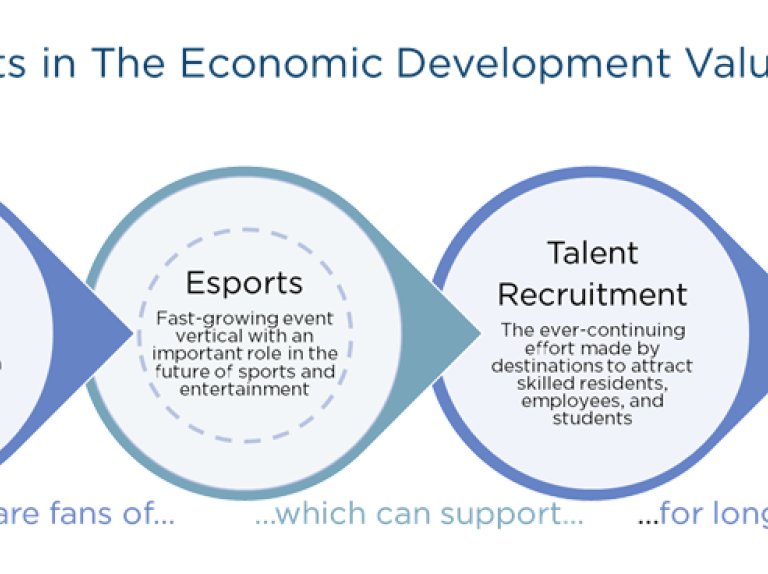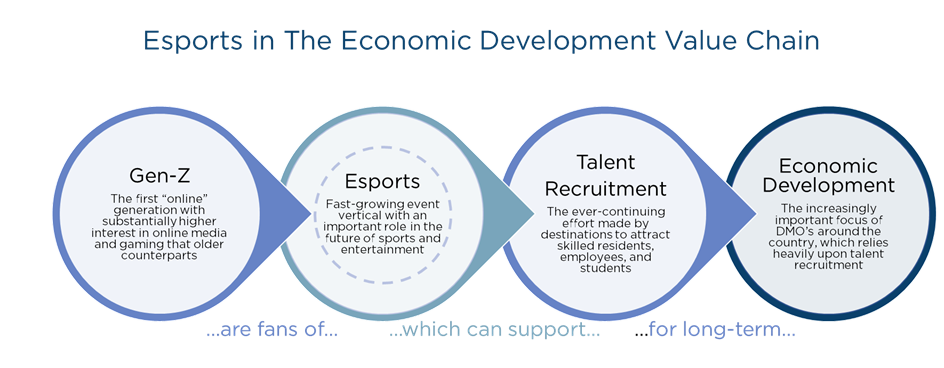
By Tyler Othen, Conventions, Sports, and Leisure
Esports, Tourism and Economic Development - How South Bend is Using Esports To Attract Gen-Z and Millennial Talent
As younger generations increasingly shift to consumption of online media and entertainment, the esports industry has been at the forefront of conversations regarding the future of sports, entertainment, travel, and even economic development.
DMO’s increasingly recognize esports as an opportunity to engage with Gen-Z and Millennial travelers and young professionals. At the same time, there is uncertainty as to how esports intersects with the visitor industry, particularly with respect to room night generation.
From a traditional event and tourism standpoint, esports is still very much in its infancy. Major esports tournaments with substantial room night generation were held in some markets before the pandemic, but still represented a very minor share of the overall tradeshow, convention, amateur sports, and other room night generating sectors.
Today, the long-term, broader value of esports to the DMO is becoming clearer. Our research suggests that in-person esports events are critical to the overall growth of the sector. We’re also seeing colleges and universities leverage strong esports programs to attract students, particularly those in the STEM sectors. We’re also seeing economic development and chamber of commerce organizations look to a broad esports market strategy to help attract businesses and highly skilled employees.

CSL and their partners in the Esports Entry Advisory have provided esports strategic planning and design services domestically in markets such as San Antonio, Washington D.C. and Atlantic City, and internationally in markets including Doha(Qatar) and Qiddiya (Saudi Arabia) with a shared high-level objective – creating facilities and programs that will help attract visitors, generate room nights, and support overall community economic development objectives.
In South Bend, Indiana, this meant developing a first of its kind esports arena within its downtown convention center.
Led by Jeff Jarnecke, the Executive Director of the Century Center in downtown South Bend, the new “Bendix Esports Arena” represents an important first step in South Bend’s mission to become a gamer destination of the future. Featuring 36 desktop stations, multiple virtual reality and console gaming stations, and a competitive mainstage, the Bendix Arena will be able to host esports tournaments, collegiate esports team practices, corporate outings, birthday parties, and community-organized gaming events. The Arena is comprised of a formerly underutilized 9,000-square foot bay of meeting rooms in the facility, which can still be used for meetings and conferences upon storage of the esports equipment.
Jeff’s previous role with the NCAA as Director of Championships and Alliances gave him a familiarity with esports’ promising trajectory. Our research demonstrated a very realistic opportunity to generate positive return on investment by injecting a modest amount of hotel tax revenue into the esports sector.
Jeff explains, “This was $2.0 million dedicated to build that sense of community, to be innovative, to be an early adopter, to be progressive, but then also to drive hotel room nights and drive energy and excitement in the downtown as well as the building.”
Rob DeCleene, the Executive Director of the Visit South Bend added, “The Bendix Arena project at Century Center could be transformative for South Bend. Increasing the presence and visibility of the gamer and associated esports demographic downtown should have ripple effects for all of our businesses and downtown merchants.”
The importance of the investment in esports extends well beyond generating new events and room nights. With South Bend’s nationally recognized and on-going transformation from a dwindling rust belt community to an emerging tech center, a stronger esports infrastructure can help to attract students, businesses and highly skilled workers in the tech sector. This broader economic development impact contributes to a strong communitywide support for the esports project.
Its impact on local education institutions has already been significant. Upon learning of the planned Bendix Arena development, Bethel University, a local private Christian college in South Bend, contacted Jeff to form a partnership wherein the University could use the Bendix as their designated home venue for a potential new esports team. Once their agreement was finalized, Bethel quickly hired coaches and recruited students to launch their first varsity esports team. Bethel and other area colleges also expressed interest in sponsoring high school tournaments at the Bendix, a tactic they think would be an invaluable recruiting tool for both their esports teams and their academic programs.
From an economic development perspective, an esports facility provides an impetus for attracting young professionals to live downtown, while also catering to the growing population of adult gamers and tech workers in the market. With its central location downtown and walkability from several planned residential developments, the Bendix will be the “arcade” that complements the bars and restaurants within several blocks of the site. “Downtown nightlife and entertainment is one of our biggest needs, and now we have a new asset in the convention center that helps create excitement for young people considering a move to our downtown,” added Milt Lee of Downtown South Bend.
The takeaway – the esports sector will increasingly support in-person events, attendance and room night generation. Beyond that, the sector is unique in its ability to cater to the next generation’s lifestyle, while supporting a community’s economic development and talent recruitment objectives.
About the Author

Project Manager
Convention, Sports & Leisure
